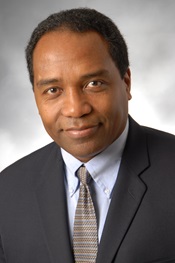The American Society of Hematology Honors Griffin Rodgers, MD, with the ASH Award for Leadership in Promoting Diversity

(WASHINGTON, July 12, 2019) – The American Society of Hematology (ASH) will honor Griffin Rodgers, MD, of the National Institute of Diabetes and Digestive and Kidney Diseases (NIDDK) in Bethesda, Maryland with the ASH Award for Leadership in Promoting Diversity for his extraordinary commitment to diversity and inclusion in hematology.
“Not only is this award a great personal honor, it also serves as a reminder and inspiration for me, as the leader of one of the National Institutes of Health’s largest institutes, to strive for racial and ethnic equity in all aspects of the work we do,” said Dr. Rodgers. “I’m proud of the progress we have made, but I know we can always do more and better.”
The ASH Award for Leadership in Promoting Diversity was established by the Society to recognize hematologists who have supported the development of an inclusive hematology workforce, encouraged the career development of underrepresented minority trainees, or made a commitment to inclusiveness through contributions in support of ASH’s mission. ASH President Roy Silverstein, MD, of the Medical College of Wisconsin in Milwaukee will present Dr. Rodgers with his award on Sunday, December 8, during the 61st ASH Annual Meeting and Exposition in Orlando.
Dr. Rodgers is the director of NIDDK at the National Institute of Health (NIH) and chief of its Molecular and Clinical Hematology Branch and Molecular Hematology Section. In these roles, he has worked to achieve broad representation of diverse populations both in the scientific workforce and among those who participate in clinical trials.
Increasing diversity in NIDDK has been a priority for Dr. Rodgers. He currently oversees the NIH/National Medical Association (NMA) Travel Award, a diversity-focused program that NIDDK established between NIH and NMA, which has provided more than 500 awards to medical researchers and fellows from communities underrepresented in science. He also leads several other programs at NIDDK focused on promoting diversity, one being the Small Grants for New Investigators to Promote Diversity in Health-Related Research.
Dr. Rodgers has also been a long-standing member of the National Advisory Committee to the Harold Amos Medical Faculty Development Program (AMFDP), an initiative of the Robert Wood Johnson Foundation. Because of his work with ASH and AMFDP, Dr. Rodgers was able to guide leadership from both organizations into a successful partnership to establish the ASH-AMFDP program, a research award designed to increase the number of underrepresented minority scholars in the field of hematology with academic and research appointments. This program has so far supported 19 scholars. The ASH-AMFDP is one of several awards ASH has established with the help of volunteers like Dr. Rodgers through its Minority Recruitment Initiative.
“Dr. Rodgers epitomizes the type of individual for whom the ASH Leadership Award was designed, as he has a proven commitment to increasing the number of minority scholars in hematology research,” said Dr. Silverstein. “I thank Dr. Rodgers for his service to ASH and hematology in promoting opportunities for under-represented minority scientists .”
The American Society of Hematology (ASH) (www.hematology.org) is the world’s largest professional society of hematologists dedicated to furthering the understanding, diagnosis, treatment, and prevention of disorders affecting the blood. For 60 years, the Society has led the development of hematology as a discipline by promoting research, patient care, education, training, and advocacy in hematology. ASH publishes Blood (www.bloodjournal.org), the most cited peer-reviewed publication in the field, which is available weekly in print and online, as well as the newly launched, online, peer-reviewed open-access journal, Blood Advances (www.bloodadvances.org).
Contact:
Sara Khalaf, American Society of Hematology
[email protected]; 202-552-4925